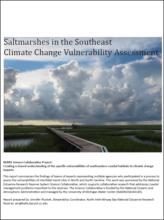
Climate change is having an impact on salt marshes in the southeastern United States through sea level rise, increases in air and water temperature, changes in precipitation patterns, and an increase in storm event intensity. However, the degree and intensity of these impacts vary from marsh to marsh, depending on local environmental conditions. Understanding this local variability is critical when making management decisions. Estuarine reserves in North and South Carolina are seeking to improve local understanding of climate change effects on southeastern marshes and provide decision makers with the information and skills they need to address these vulnerabilities by using the Climate Change Vulnerability Assessment Tool for Coastal Habitats, or CCVATCH. Through a 2016 Science Transfer project this project, staff from the North Carolina Reserve and North Inlet-Winyah Bay Reserve worked together to conduct assessments at two sites in South Carolina and five sites in North Carolina.
This report summarizes the findings of teams of experts representing multiple agencies who participated in a CCVATCH process to assess the vulnerabilities of intertidal marsh sites in North and South Carolina.The report includes:
- A full description of the methods and data sources used
- A two-page summary for each of the sites assessed, including specific vulnerability scores and management recommendations
- A discussion of specific climate impacts and a comparison of vulnerability scores across sites
- A summary of key research needs that emerged from the process
Plunket, Jennifer. 2018. Saltmarshes in the Southeast Climate Change Vulnerability Assessment. Report and supporting materials available at: https://ccvatch.wordpress.com